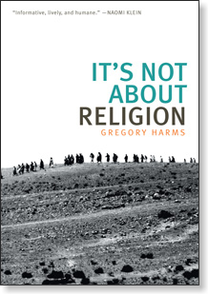If asked about the source of the problems in the Middle East, the average American undoubtedly would answer "Islam." At least that is according to Gregory Harms in his new book It’s Not About Religion. He writes, “It has become a virtual reflex to sum up the different conflicts in the region as being a throwback to biblical times.” An independent scholar focusing on US/Middle East relations, Harms sets out to systematically portray what he sites as the true sources of conflict in the Middle East and the role of the West, especially the United States. It’s Not About Religion is the story of a calculating Western government, one that has tried to manipulate the region and in the process caused many of its problems. The volume is laid out in a straightforward manner offering a five-part look at Middle Eastern politics: how Muslims have been presented to Americans historically, Western Europe’s policies in the Middle East, U.S. involvement in the region, the role of religion in the Middle East, and finally the imperialist view that governed America’s actions in the region. A major theme throughout the book is a depiction of a meddling United States whose actions created unforeseen consequences. Harms clearly shows specific cases of this phenomenon. For example, in the early 1950s, Iran's prime minister, Muhammad Mossadeq, was interested in nationalizing the then British-owned oil industry. The White House, with close ties to England and oil interests of its own, did not view Mossadeq favorably. A coup was staged in 1953 to overthrow Mossadeq and replace him with a more Western- friendly Shah in a government mission called Operation Ajax. The author of It’s Not About Religion, Gregory Harms’, take on the matter is strikingly similar to the New York Times' bestseller All the Shah’s Men: An American Coup and the Roots of Middle East Terror, which also noted the unfairness of the situation. Stephen Kinzer, author of All the Shah’s Men notes, “‘My only crime,’ Mossadeq told his judges, ‘is that I nationalized the Iranian oil industry and removed from this land the network of colonialism and political and economic influence of the greatest empire on earth.’” Harms argues what Stephen Kinzer suggests that “the years following Operation Ajax saw not only a return to the authoritarian oppression long familiar to the Iranian people, but also an upgrade of the Shah’s repressive methods in order to discourage further ‘instability.’” Harms, like Kinzer, questions what Iran would be like today had the United States not interfered. It is a good question and worth contemplating. Although the title of the book is It’s Not About Religion, Harms does consider religious groups that have sprung up in the region. He explains how these different religious groups were formed and came into popularity but depicts certain groups like the Muslim Brotherhood very differently from some of his contemporaries. In her memoir, Infidel, Ayaan Hirsi Ali, a woman raised in Islamic states who claimed asylum in the Netherlands, spoke out against Islamic groups like the Brotherhood and their treatment of women. She champions a secular democratic Middle East and does not support the Muslim Brotherhood. Harms, on the other hand, argues, “Although the Brotherhood had periods of violence, on balance it steered a moderate course.” Obviously his view of religious extremists groups is different that Ali but he explains that religion offers hope for the people in this region and it is hope from “leaders who function either as attendants to American power.” In this way, he again shows how the United States and Western policies have set up an unstable region where religious extremism can flourish. As an American, It’s Not About Religion can seem offensive at times. The author is not coming from the popular Western point of view. In the book, Harms considers Robert Fisk, a Middle East news reporter, who described fellow reporters as having “deep insight many of them, into what’s happening in the region, but when I read their reports it’s not there. Everything they have to tell me of interest has been erased.” Gregory Harms argues that this is proof of a biased media. He states, “State power pursues its foreign agenda, which is often carried out with the private sector’s well-being in mind. The private sector owns the media and is not going to imperil its interests.” For a reader who may have been raised with the idea of a free and unbiased press, this feels like an assault against everything he or she believes, but the point Harms raises is an interesting one. It plays into the overall theme of the American government’s manipulation of both foreign and domestic entities. It’s Not About Religion offers an informative look at this underlying problem of the Middle East, taking the discourse away from the tired excuse of religion. It is an enlightening read, well-written, concise and clear. Perhaps a book such as this helps more of us challenge what we think we know about a multifaceted problem. Bibliography Kinzer, S. (2003). All the Shah’s Men: An American Coup and the Roots of Middle East Terror. Hoboken, New Jersey: John Wiley & Sons, Inc.  Gregory Harms is an independent scholar specializing in American foreign policy and the Middle East. He lectures, keeps a blog on Facebook, and has published articles onCounterPunch, Truthout, and Mondoweiss. Harms has traveled throughout Israel, the West Bank, and Gaza, and has been interviewed on BBC Radio. His first book, The Palestine-Israel Conflict: A Basic Introduction, 3rd ed. (Pluto Press, 2012), as the title suggests, is a brief and general summary of the conflict, written for students and the general reader. The first edition (2005) was selected as a ChoiceOustanding Academic Title. Harms's second book, Straight Power Concepts in the Middle East (Pluto Press, 2010), is an examination of US regional policy in the context of US-Israeli relations. And his third title, It's Not about Religion (Perceval Press, 2012), addresses the common question of religion concerning Middle Eastern instability. Harms can be reached at [email protected] Antonia DiBona received her B.S. in Biology from Ursinus College in 2005 and worked as a middle school science teacher in a charter school for underprivileged youth for three years after college. Although teaching was a challenge and very rewarding Antonia has decided to pursue a second passion, writing. She is a first year graduate student at Rowan University pursuing her M.A. in Writing Arts. Her focus is nonfiction and she recently published an article about women in the sciences for the journal HBAdvantage.
0 Comments
Leave a Reply. |
Archives
July 2024
Categories
All
|
|
Glassworks is a publication of Rowan University's Master of Arts in Writing 260 Victoria Street • Glassboro, New Jersey 08028 [email protected] |
All Content on this Site (c) 2024 Glassworks
|


 RSS Feed
RSS Feed
